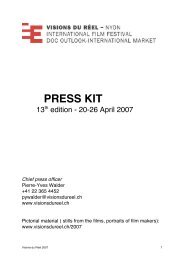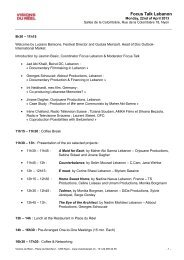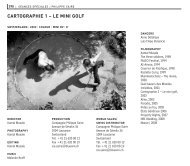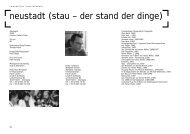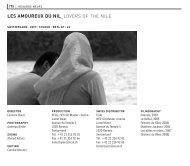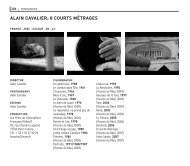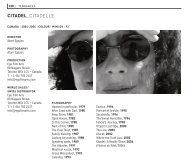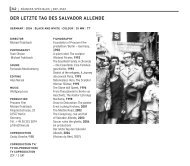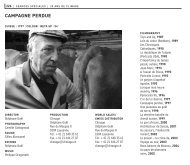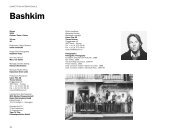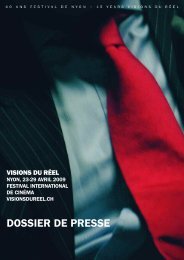Katalog 2013.pdf - Visions du Réel
Katalog 2013.pdf - Visions du Réel
Katalog 2013.pdf - Visions du Réel
Create successful ePaper yourself
Turn your PDF publications into a flip-book with our unique Google optimized e-Paper software.
132 état d’esprit<br />
Paul-Julien Robert<br />
Meine Keine<br />
Familie<br />
Austria | 2012 | 93’ | HD | German, French<br />
My fathers, my mother and me<br />
International Premiere<br />
compétition regard neuf<br />
Cinematography<br />
Klemens Hufnagl, Fritz Ofner<br />
Sound<br />
Oliver Neumann,<br />
Sebastian Meise,<br />
Till Röllinghoff,<br />
Stefan Rosensprung<br />
Editing<br />
Oliver Neumann<br />
Music<br />
Walter Cikan,<br />
Marnix Veenenbos<br />
Pro<strong>du</strong>ction<br />
Oliver Neumann<br />
(FreibeuterFilm)<br />
Filmography<br />
2012 Meine keine Familie<br />
2005 Erlebt (sf)<br />
2005 Der Affte Beisst, der<br />
Mensch Erzieht (sf)<br />
2002 Good Morning Sir (sf)<br />
Contact<br />
FreibeuterFilm<br />
welcome@freibeuterfilm.at<br />
www.freibeuterfilm.at<br />
La Kommune créée par Otto Muehl<br />
était la plus influente des années 1970.<br />
Antiautoritaire, elle se basait sur le rejet<br />
des valeurs et des règles bourgeoises et<br />
sur une expérience partagée et ouverte<br />
de la sexualité et de l’é<strong>du</strong>cation des<br />
enfants. Ancien actionniste autrichien,<br />
Muehl a été un artiste controversé et<br />
un pilier de la contre-révolution européenne.<br />
Mais à la fin des années 1970,<br />
ce qui apparaissait comme une utopie<br />
commença à s’essouffler. La communauté<br />
de Friedrichshof devint un enfer<br />
pour les enfants qui en<strong>du</strong>rèrent la<br />
cruauté grandissante de Muehl, passant<br />
<strong>du</strong> gourou sexuel anarchiste et reichien<br />
au patriarche. Paul-Julien Robert, le réalisateur<br />
<strong>du</strong> film, était l’un des enfants<br />
de la Kommune. En quête de son père<br />
biologique, alors qu’il interroge sa mère<br />
qui a été une fidèle de Muel pendant<br />
longtemps, il se confronte à un héritage<br />
difficile et complexe. Tout en évitant soigneusement<br />
de diaboliser Muehl, même<br />
s’il a finalement été reconnu coupable<br />
de maltraitance d’enfants, le réalisateur<br />
accepte l’idée que, bien qu’il n’ait eu ni<br />
famille ni père traditionnels, aujourd’hui,<br />
sa famille est l’une des plus extraordinaires<br />
qui soit.<br />
Die von Otto Muehl gegründete Kommune<br />
war in den 1970er-Jahren die einflussreichste<br />
ihrer Art. Die antiautoritäre<br />
Haltung gründete auf der Ablehnung<br />
des bürgerlichen Wertesystems und<br />
einer geteilten und offenen Erfahrung<br />
von Sex und Kindererziehung. Muehl,<br />
ein ehemaliger Wiener Aktivist, ist ein<br />
umstrittener Künstler und Anhänger der<br />
europäischen Gegenrevolution geworden.<br />
Doch was wie eine utopische Welt<br />
aussah, lief Ende der 1970er-Jahre aus<br />
dem Ruder. Die Kommune am Friedrichshof<br />
wurde für die Kinder zur Hölle,<br />
die Muehls zunehmenden Grausamkeiten<br />
ausgesetzt waren, der vom anarchistisch-reichischen<br />
Sexguru bis hin zum<br />
Übervater alle Register abdeckte. Paul-<br />
Julien Robert, der Regisseur des Films,<br />
gehörte zu den Kindern der Kommune.<br />
Auf der Suche nach seinem wahren<br />
Vater und der Befragung seiner Mutter,<br />
einer langjährigen Muehl-Anhängerin,<br />
kommt er mit einem schwierigen und<br />
komplexen Erbe ins Reine. Unter Vermei<strong>du</strong>ng<br />
einer Dämonisierung Muehls,<br />
der später für Kindesmissbrauch verurteilt<br />
wurde, kommt der Regisseur zu dem<br />
Schluss, dass er zwar kein traditionelles<br />
Familienleben und keinen normalen<br />
Vater gehabt haben mag, er aber dennoch<br />
aus einer ziemlich erstaunlichen<br />
Familie kommt.<br />
The Kommune that Otto Muehl created<br />
was the most influential one of<br />
the 1970’s. Its anti-authoritarian allure<br />
stemmed from the rejection of bourgeois<br />
values and rules and from a shared and<br />
open experience of sex and child raising.<br />
Former Wiener Aktivist, Muehl has been<br />
a controversial artist and a stalwart of the<br />
European counter-revolution. But at the<br />
end of the 1970’s what looked like a utopian<br />
dream went sour. The Kommune at<br />
the Friedrichshof became a living hell for<br />
the children that had to en<strong>du</strong>re Muehl’s<br />
ever increasing cruelty, spanning from<br />
anarchistic-reichian sexual guru to über-<br />
Father. Paul-Julien Robert, the director<br />
of the film, was one of the children of<br />
the Kommune. On the quest for his real<br />
father, while questioning his mother who<br />
was a long standing Muehl devotee in<br />
the past, he comes to terms with a difficult<br />
and complex legacy. Carefully avoiding<br />
to demonize Muehl, even though he<br />
was later convicted for child abuse, the<br />
director accepts the fact that while he<br />
may not have had a traditional family or<br />
a father, to this day he still has one of the<br />
most amazing families ever.<br />
Giona A. Nazzaro



